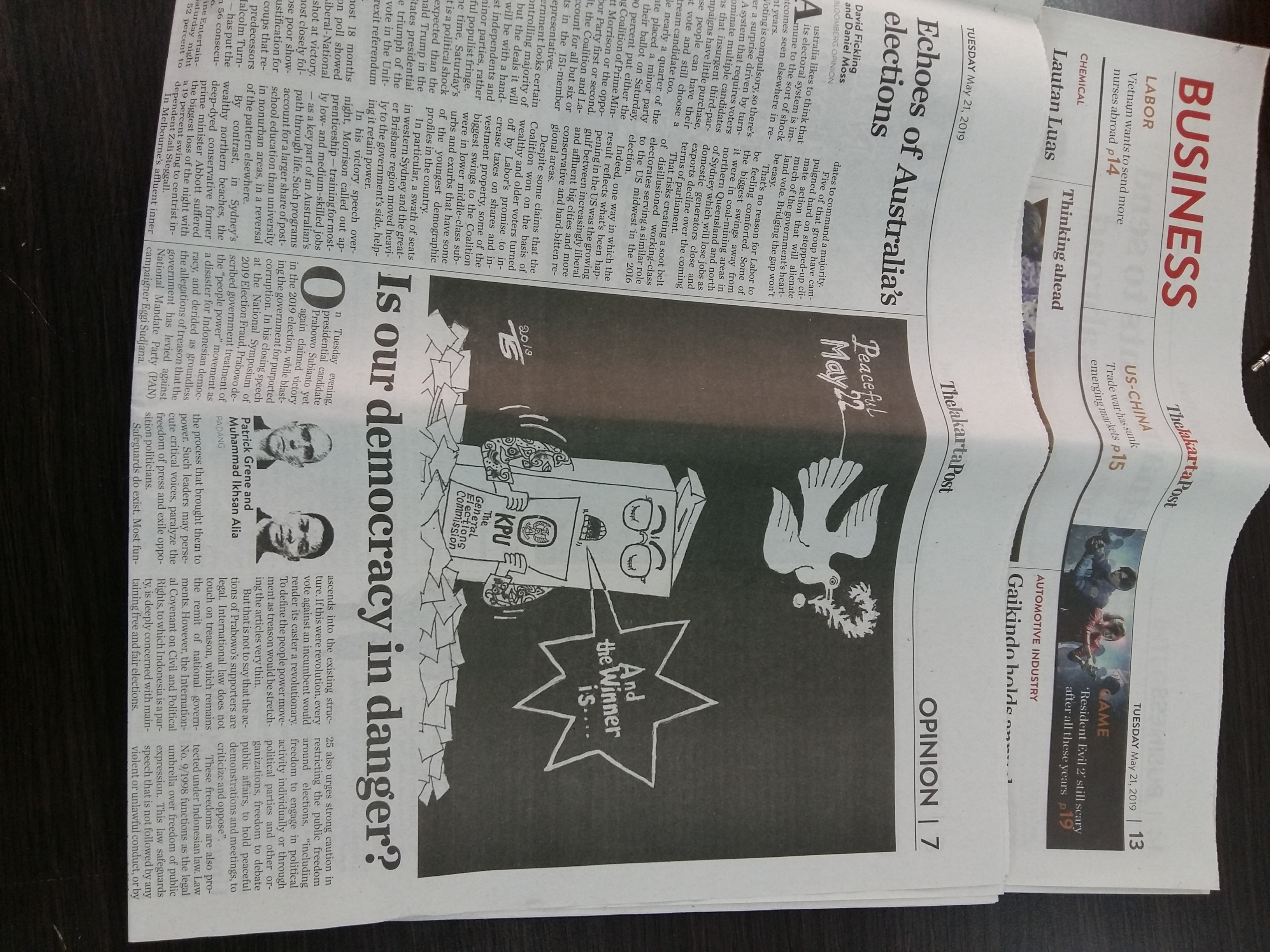Electoral Controversy: Treason and Troops
I have now been working with PUSaKO – the Center for Constitutional Studies at the University of Andalas in West Sumatra, for just over a week. The team is great, a mixed group consisting of students mixed with some older researchers, under the guidance of Feri Amsari, who has an LLM degree from William & Mary among his other educational achievements. The mood is generally one of enthusiastic inquiry, with an academic appreciation for the often baroque complexity of Indonesian law.
Right now, however, the interest is far more vigorous than merely academic. Constitutional, and especially electoral law is at the forefront of the public mind, following the elections earlier this year.
The presidential election confirmed the incumbent, Jokowi, as the victor over his opponent, Prabowo Subianto, winning with some 55.5% of the vote. However, the election has been intensely disputed by Prabowo and his supporters.
Indonesia has a history of corruption, and of public condemnation of corruption, and the people are more ready to accuse their government of acting illegally in the interests of the elite than most others. In particular, the regime of Suharto left a lingering ill-taste in the mouths of many, who felt, with some justification, that the government had degenerated at his hands into a mere kleptocracy.
This readiness to voice resentment of purported corruption has obvious advantages in that it may act to nip such behavior in the bud. Unfortunately, however, it also lends itself as a weapon to those who seek to harness public resentment in an effort to overturn the democratically established order.

This is the current situation. Prabowo has accused the government of corruption and electoral manipulation. In particular, he has cited the unfortunate deaths of some 500 electoral officials during the course of the election as evidence that underhanded pressure has been exerted by the incumbent government. The government notes that in part because of the insistent contestation by Prabowo’s party, the officials were forced under electoral regulations to go for days without sleep in order to count and re-count, and ill-health and old age combined with this situation took an all-too-predictable toll.
Prabowo and his supporters have refused government explanations and continue to lobby against the result. Especially worryingly, Prabowo, acting in part through a mouthpiece in the politician Eggi Sudjana, demanded popular resistance to the results in the so-called ‘people power’ movement. While this largely consisted of protest marches, there were worrying noises about sufficient numbers justifying Prabowo’s supporters in discarding the rule of law. Prabowo has quite effectively motivated the religious right on his behalf, and has broad support in the outlying regions, who feel that the concentrated popular support for the incumbent on the island of Java steamrolls their voice in the elections process. In this context, the threat of a violent uprising against the government is not nearly as conjectural as one might like.
The government responded rapidly. First, it made use of the Indonesian Penal Codes to accuse Eggi Sudjana of treason. In the Indonesian legal structure, this occupies a notch beneath open rebellion in transgressions against the government, and a guilty verdict can lead to between 5 and 15 years in prison.
Additionally, the government attempted to mobilize hundreds of thousands of police and military troops, ostensibly to protect the officials and offices that constitute the electoral apparatus of Indonesia. These troops would theoretically take no action unless attacked.
There has been considerable concern throughout Indonesia on all these grounds. There is a grave risk of violence on the ground, as Prabowo’s mobilized supporters meet with the government-appointed troops. There is also a considerable risk that assumption of extraneous powers by the government sets a dangerous precedent for future governments, who may be less interested in tolerance and the protection of democracy.
My article analyzing the situation from a legal perspective appeared in the Jakarta Post on 21 May, and is available online at: https://www.thejakartapost.com/news/2019/05/21/is-our-democracy-danger.html